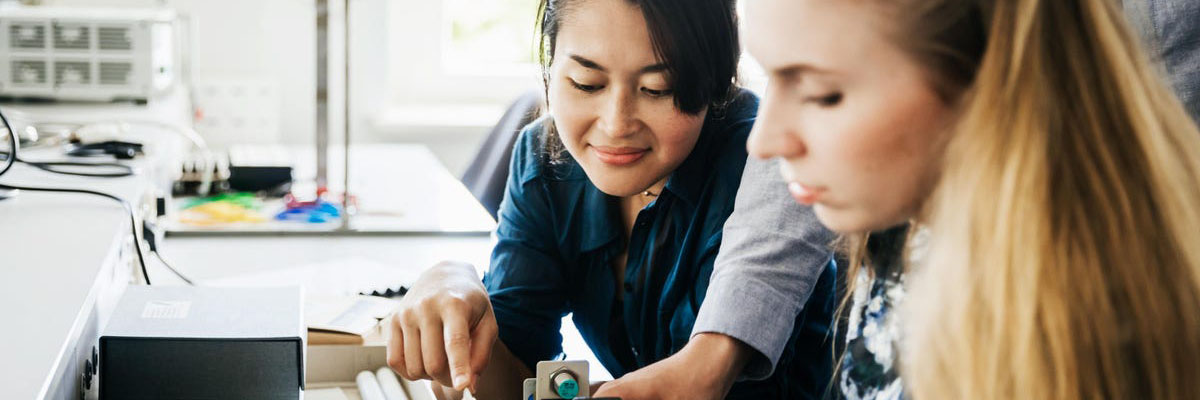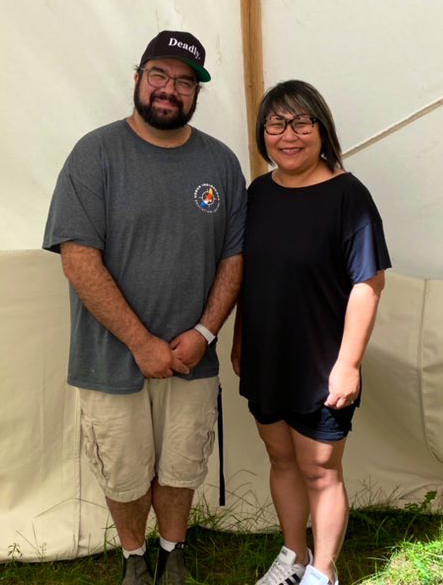
Nine high school students from W.C. Eaket Secondary School in Blind River, Ont., took part in the inaugural offering of the Indigenous Engineering & Innovation by Design program. The students applied Indigenous knowledge and traditional engineering processes to design solutions to challenges in their community.
The Lassonde School of Engineering k2i academy team recently visited Blind River, a remote town in northeastern Ontario, for the launch of the new Indigenous Engineering & Innovation by Design program for high school students. From July 18 to Aug. 12, the team, joined by Jeffrey Harris, assistant professor of mechanical engineering and the undergraduate program director at Lassonde, visited the W.C. Eaket Secondary School, part of the Algoma District School Board, to deliver this brand-new, work-integrated learning program.

Nine students who took part in the inaugural offering of the program, which was co-developed by Bryan Bellefeuille, a teacher at W.C. Eaket. Students worked on a variety of engineering projects to apply Indigenous knowledge and traditional Indigenous engineering processes to design solutions to challenges in their community. Along the way, the students had an opportunity to pursue their curiosity and interests. As part of the program’s design, the student participants earned a high school interdisciplinary credit in Indigenous Engineering, Technology & Innovation by Design.
“Many things excite me about this program and partnership,” said Brian Beauchamp, principal of W.C. Eaket Secondary. “I believe that we are not only levering Indigenous ways of knowing (an ethical and moral responsibility), but we are also helping students to think about modern engineering challenges through traditional ways which yield a more thorough and complex approach, ultimately providing a better solution.”
Through the program, students are learning about traditional Indigenous technologies and engineering design. They are connecting to stories that have been told for thousands of years and learning about how Indigenous knowledge connects to the land, provides perspectives that connect us to the world around us, and creates opportunities for creative problem solving. “I have enjoyed the hands-on experience of the program,” says Grade 11 W.C. Eaket student, Timotej Mason. “Usually, we learn how to do things, in this program, we learn by doing things. Doing our own science is a lot of fun.”
Bellefeuille brings these teachings to life in an immersive, land-based learning experience which captivates the imagination and makes connections to the contemporary technologies of today.
“I was truly impressed with the ideas generated by the W.C. Eaket students and the way that Mr. Bellefeuille was able to connect and engage with students,” says Harris. “This was my first experience learning aurally from traditional storytelling, and it gave me a greater appreciation for knowledge that has been passed on through storytelling for thousands of years.”
Students have been engaging in teacher-directed projects and experienced traditional Indigenous engineering through examples. They are also investigating materials through microscope explorations. Workshops were also provided by k2i academy mentors in western engineering design, computational thinking and coding, 3D design and electronics (including breadboards, circuitry and micro: bit).
In the fall, the course will be offered as a timetabled course for students at W.C. Eaket Secondary School.
“I am very excited about our strong and growing connection to Lassonde’s engineering program at York University,” said Beauchamp. “A perennial challenge for us is to understand expectations beyond secondary school. We are left with questions about how students will be expected to learn and how they will be assessed. Historically we have often relied on our own postsecondary experiences, which are dated, or conversations with recent graduates and liaison officers. This partnership is helping us to prepare our students with more concrete information about what to expect.”
All students at W.C. Eaket Secondary who are interested in learning about Indigenous engineering and incorporating contemporary technologies can register for the course. It has been designed to welcome students at any grade level as an open elective with an additional Grade 12 university option also available.
“For the past year, we have been in conversations with Bryan Bellefeuille and collaborating to strengthen our relationship with the community and ensure that the program design and implementation are truly connected to Bryan’s vision for Indigenous engineering and STEM education,” said York’s Lisa Cole, who is the director of programming for the k2i academy. “It was an absolute pleasure to join him in the launch of this program, learn from him, support him to be able to realize his vision for this program and meet the amazing high school students who came every day to participate, learn and engage with each other in exploration.”
In the future, k2i academy hopes to continue working with the Algoma District School Board and expand this program and similar initiatives to other schools and school boards across Ontario and Canada in their aim to break down systemic barriers to STEM education and provide unique, hands-on STEM learning opportunities.
